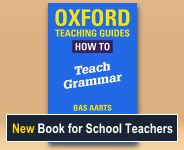Topic: Noun
Nouns are a very important word class, and are often (but not always) words for people, places and things. They can be marked as plural or possessive.
- « first
- ‹ previous
- 1
- 2
- 3
Englicious contains many resources for English language in schools, but the vast majority of them require you to register and log in first. For more information, see What is Englicious?


